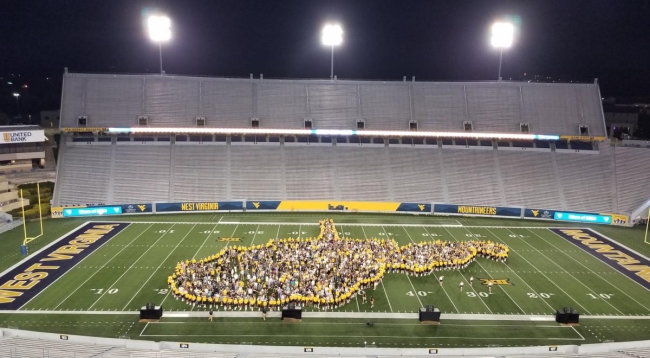You have /5 articles left.
Sign up for a free account or log in.

West Virginia University celebrates a "Sunday Night Lights" welcome week event for second-year students.
Courtesy of West Virginia University
As colleges and universities prepare for the new academic year, they’re also planning for a return to in-person welcome weeks for new and returning students.
After a year of mostly virtual welcome weeks due to the pandemic, student affairs administrators have been busy organizing and arranging for in-person events. But even as they prepare for students to come to campuses, institutions across the country are also revising or restoring their vaccination and masking requirements and ramping up vaccination drives as infection rates of the much more easily transmissible Delta variant of the coronavirus continue to climb.
The University of Texas at Austin announced last week that all students would be required to get a COVID-19 test before the first day of classes, but they will not be required to wear masks or be vaccinated.
Suseth Muñoz, a senior and vice president of the UT Austin Senate of College Councils -- an arm of the student government -- has some concerns about the return to normalcy for Longhorn Welcome, as the university’s orientation week is called.
“It’s scary to see that these events are going to have, like, great amounts of people that come in and out,” Muñoz said. “Luckily, a lot of them are outside, but I can say that personally, I will try to steer clear of some events that I know will garner a lot of crowds.”
The university’s COVID-19 Modeling Consortium, a network of researchers and health professionals building models to detect, project and combat COVID-19, released a report Aug. 11 projecting that thousands of UT students could become infected in the fall semester if “proactive” testing measures weren’t taken or students did not wear masks indoors.
The report estimates 57 percent of UT students are fully vaccinated and projects COVID-19 prevalence throughout the fall semester if vaccination rates remain near 60 percent and proactive testing is not implemented. "Then the prevalence of symptomatic infections is expected to peak between 90 and 320 cases (median: 180) and the total infected during the fall semester to be in the range of 5,000 to 16,300 (median: 11,200)," the report states.
“Usually, this would be a great event for students to get connected on campus and to feel welcome,” Muñoz said. “But as of right now, I think that these events are going to serve as a hub that may not be the safest space, especially when we cannot enforce mask wearing.”
Muñoz said UT should follow the lead of the University of Texas at San Antonio and have all virtual classes for the first three weeks of the semester.
“They could … have those few weeks to figure out how their costs are going to look, how many people are actually coming on campus, and developing a plan that is actually going to keep most students safe on campus,” she said.
Need to ‘Pivot’
Kayleigh Damphousse, a transition coordinator for Longhorn Welcome, said her team is encouraging masking indoors and outside in crowded spaces and promoting the university’s health services guidance.
“We’re just trying to encourage our campus partners to take those guidelines into their events, whether that means ‘Can we have an event outside when it’s normally inside?’ or ‘Can we be thoughtful about the spacing?’” Damphousse said.
Damphousse has been planning Longhorn Welcome since January, but her team aims to remain flexible as the path of the pandemic takes unexpected turns.
“We’re excited and we’re glad to greet our students, but we know that things can change at any moment, so we’re kind of waiting for if things might change and kind of thinking of backup plans as we go,” Damphousse said.
While most of the events for Longhorn Welcome will be in person, Damphousse said the university would be offering virtual events, such as a scavenger hunt, games and a virtual career fair.
Muñoz said there will be a hybrid format for almost all welcome week events sponsored by the Senate of College Councils and the organization is encouraging students who aren’t vaccinated or don’t wear masks to attend those events virtually.
Alison Leach Hughes, associate dean of students at Florida State University, said planning for orientation and welcome week has also meant being adaptable to changing COVID guidelines.
“It’s definitely required us to be flexible,” Leach Hughes said. “The name of our office is New Student and Family Programs, and on occasion, we’ve joked that we are New Student Flexible Programs. We have to maintain this level of adaptability and willingness to, for lack of a better term, pivot.”
Florida State hosts an almost two-week-long welcome with events including karaoke, an outdoor block party, gaming and more. While the university doesn’t have a mask or vaccine mandate, it is offering students vaccination incentives such as gift cards, an iPad, $3,500 in tuition and fee assistance, and use of a luxury suite at the Tucker Civic Center, where sporting and other events are held.
Edwin Darrell, director of residential student experience at FSU, said he believes “our students are doing the right things to really keep themselves safe and keep their peers safe.” He said the campus has an expectation for students to wear masks, and most events will be outside. Welcome week programming will pivot if necessary at the direction of FSU’s Board of Governors, Darrell added.
“We are still encouraging and we’re expecting that students for any of our indoor events will wear masks,” Darrell said. “And then for outdoor events, we are strongly encouraging students to continue to wear a mask and follow all the mitigation steps that are recommended by not only our Florida Health Advisory, but also recommended by the CDC.”
The university will host a job fair virtually and a hybrid virtual and in-person student involvement fair as part of welcome week. The university is also offering students self-guided tours of the Florida Capitol in Tallahassee.
“All of our programs, whether they’re academic, social, cultural, they’re offering both face-to-face programming and event options, but they’re also being really mindful offering the flexibility of a virtual hybrid option as well,” Darrell said.
San José State University and the city of San José in California are having citywide events to welcome students not only to campus, but also to the San José community. A university press release described the institution's "longstanding and deep relationship with the City of San José and a strong commitment to the community." The university also sponsors an "SJSU Loves SJ" initiative that fosters connections between students and members of the local community and includes a lighting ceremony of the City Hall tower and rotunda and a flag raising at City Hall.
“This is shaping up to be one of the most anticipated fall semesters we have ever seen at SJSU,” President Mary Papazian said in a statement. “While there remains uncertainty or even anxiety for some, I believe we will get through it together as a campus and as a community. The joy and vibrancy we will experience with our return to campus and a return to downtown life will be unlike anything we have ever seen before.”
The university is requiring students living in campus housing to be fully vaccinated and to sign an acknowledgement of COVID-19 safety protocols and agree to follow them before moving in. Students who aren't fully vaccinated or who don't sign the acknowledgement aren't allowed to move into campus housing. The university also requires mask be worn inside campus facilities or in shared vehicles at university-sponsored activity.
Indiana University is requiring vaccines for students and employees, and there is a mask mandate for indoor spaces, regardless of vaccination status. Sarah Nagy, senior associate director at the Office of First-Year Experience Programs for the university, said programming for welcome week followed university, Centers for Disease Control and Indiana health department guidelines.
She said welcome week events, which started Monday and will include an outdoor concert with pop star Charli XCX, can be adjusted and moved to different locations for more social distancing, spaced apart, limited in crowd size or ultimately moved to a virtual platform.
“We’re nimble enough that we can adjust to do what we need to do to keep people safe,” Nagy said.
At West Virginia University, the welcome week program includes taking a class picture with masks on. The annual outdoor concert was canceled. The university reopened its COVID incident command center last month due to an increase in infections and the pending return of students.
Corey Farris, dean of students at WVU, said university officials were hoping the concert could take place. “But given what is happening with the Delta variant, as well as the vaccination rate, we’re just a little concerned about that.”
Today, WVU is reinstating its mask requirement in classrooms and labs on its three campuses for all people regardless of vaccination status for the next 30 days. The university said the decision comes from a variety of factors, including the potential need for a booster shot and problems with faculty, staff and students not submitting their vaccine verification or a negative COVID test. Plans for the upcoming year could be adjusted based on infection and hospitalization rates along with input from health experts.
“People are incredibly excited, and as I said to my team, we need our students and the students need us right now,” Farris said. “And so we’re going to be there for each other in the next few days as the campus comes back to life.”
While most colleges and universities are returning to in-person welcome weeks, some institutions are still opting for virtual events for students who aren’t comfortable going to in-person events.
Genevieve Bertone, director of student equity and persistence at Santa Rosa Junior College in California, said it was an “easy” decision for her team to make the college’s welcome week all virtual.
“In student life, we go where the students are, and in COVID, that’s virtual,” Bertone said. “So it was an easy decision to go virtual with our welcome week activities.”
The college will host events on Zoom for students to meet each other and find ways to be involved on campus. There will be one in-person event, however, a curbside food drive for students.
“We know that making students feel welcome is a critical first step in their success,” Bertone said. “Now more than ever, students need to be connected. Connected to resources, connected to faculty and staff, and connected to each other.”








